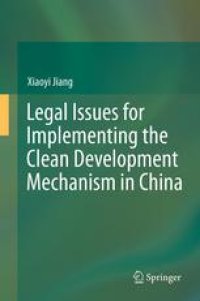
Ebook: Legal Issues for Implementing the Clean Development Mechanism in China
Author: Xiaoyi Jiang (auth.)
- Tags: Private International Law International & Foreign Law Comparative Law, International Environmental Law, Environmental Law/Policy/Ecojustice, Climate Change, Public International Law, Environmental Economics
- Year: 2013
- Publisher: Springer-Verlag Berlin Heidelberg
- Edition: 1
- Language: English
- pdf
Today, climate change is among the most hotly-debated topics. The Clean Development Mechanism (CDM), one of the three financial mechanisms under the Kyoto Protocol open to developing and developed countries, was devised to assist in mitigation of global warming. This book discusses what China should do to make full use of the CDM to promote sustainable development and to meet the challenge of climate change from a legal perspective. The findings lead to the conclusion that the CDM has limitations in promoting sustainable development in China, and thus should be regarded only as a complementary instrument in combating climate change. Legal strategies for improving the implementation of CDM projects under the legal framework in China are thus put forward, and some proposals for China to meet the challenge of climate change in the post-2012 era are made.
This book offers new insights to academics and policymakers both in the public and private sector. It is intended for legal practitioners and researchers on carbon trading as well as policymakers interested in the role of developing countries in climate change law. In addition, it is of interest to stakeholders of CDM projects.
Today, climate change is among the most hotly-debated topics. The Clean Development Mechanism (CDM), one of the three financial mechanisms under the Kyoto Protocol open to developing and developed countries, was devised to assist in mitigation of global warming. This book discusses what China should do to make full use of the CDM to promote sustainable development and to meet the challenge of climate change from a legal perspective. The findings lead to the conclusion that the CDM has limitations in promoting sustainable development in China, and thus should be regarded only as a complementary instrument in combating climate change. Legal strategies for improving the implementation of CDM projects under the legal framework in China are thus put forward, and some proposals for China to meet the challenge of climate change in the post-2012 era are made.
This book offers new insights to academics and policymakers both in the public and private sector. It is intended for legal practitioners and researchers on carbon trading as well as policymakers interested in the role of developing countries in climate change law. In addition, it is of interest to stakeholders of CDM projects.